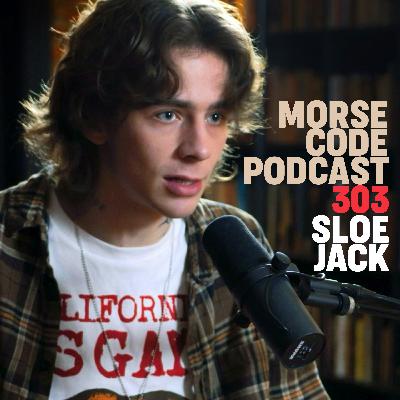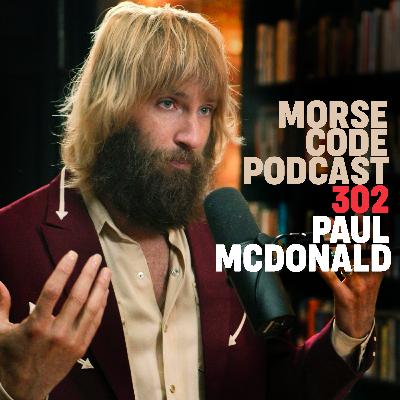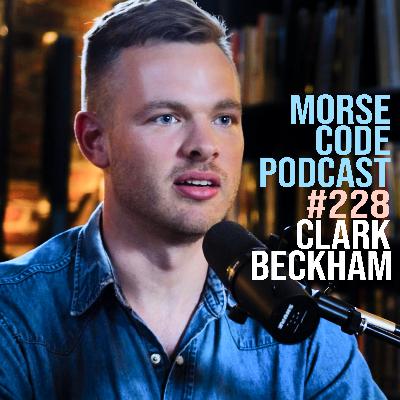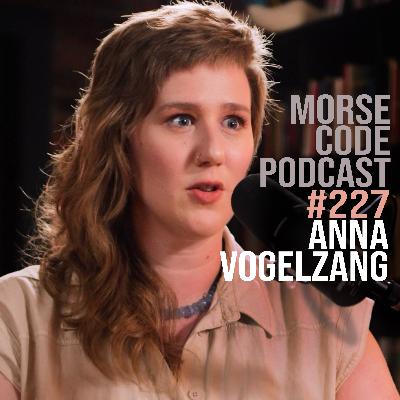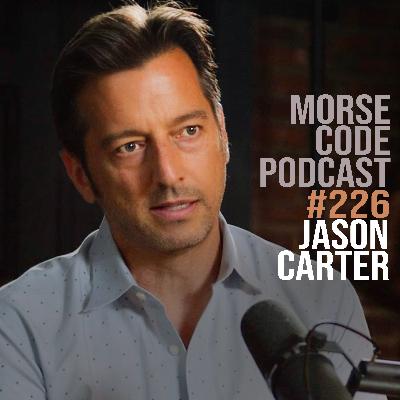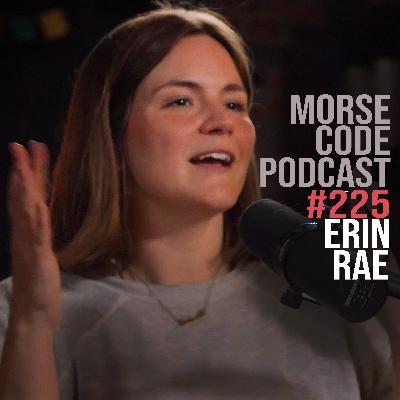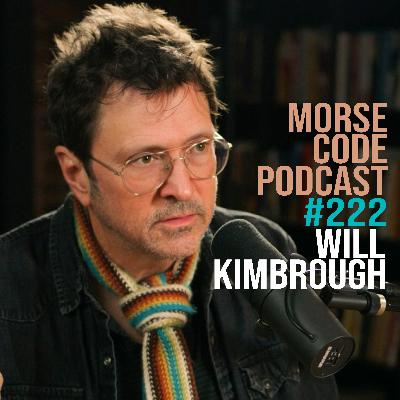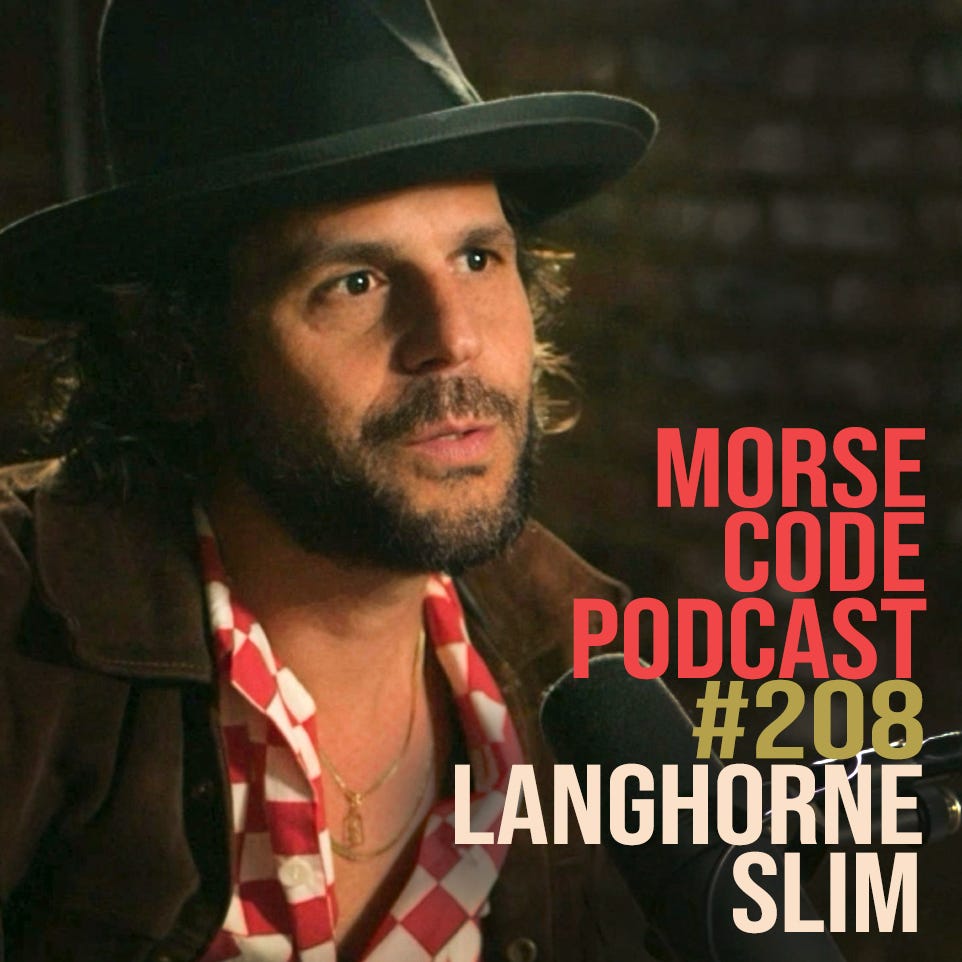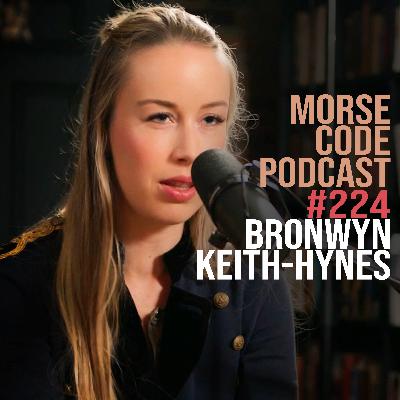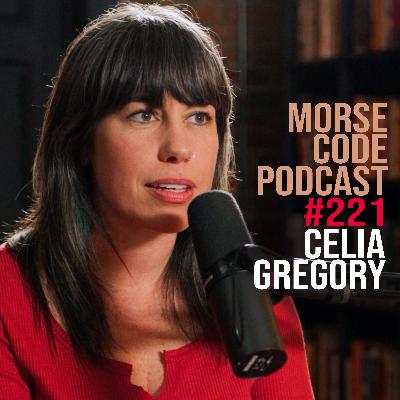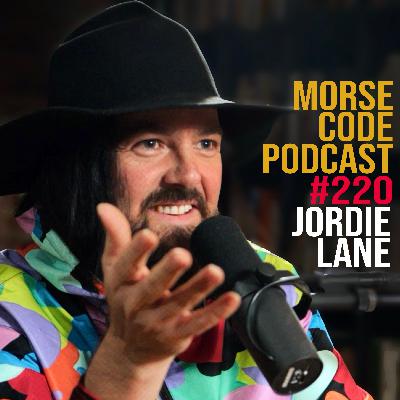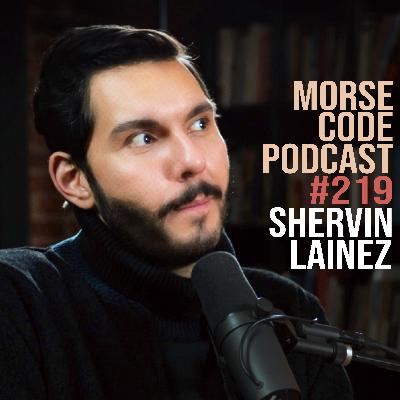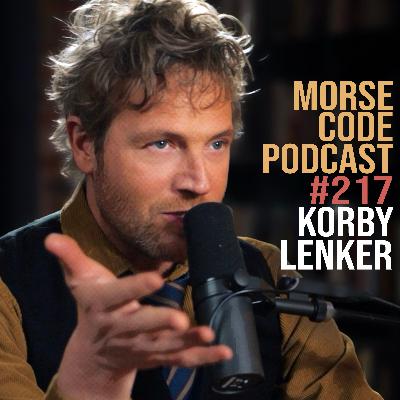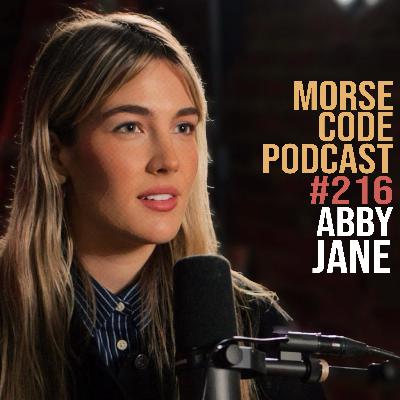Discover Morse Code Podcast with Korby Lenker
Morse Code Podcast with Korby Lenker

Morse Code Podcast with Korby Lenker
Author: Deep talks and sharp performances with the best musicians and writers working today.
Subscribed: 5Played: 49Subscribe
Share
© Korby Lenker
Description
Deep talks, sharp performances and empowering revelations from musicians and writers, live from East Nashville. Unpretentiously hosted by Korbykorby
korby.substack.com
korby.substack.com
79 Episodes
Reverse
There’s something I love about artists who don’t wait for permission. The ones who carry a crowbar so they can pry the tiny crack into a opening big enough to strut though. Judy Blank is one of those crowbar carryin types.Her latest ablum, “Big Mood” came out on tastemaker label Rounder Records this September. She grew up in the Netherlands, obsessed with American music — gospel, folk, Laurel Canyon, Springsteen. Instead of treating that dream like a fantasy, she followed it. First a trip to the States. Then a show. Then another. One small door opened, she walked through, and another one opened after that. Eventually, she found herself signed to Rounder Records and living in Nashville — not because someone chose her, but because she kept showing up.This week on The Morse Code Podcast, Judy and I talk about the slow-building path to a creative life. No big break, no silver bullet — just persistence, a willingness to reinvent, and a deep love for the craft itself. We talk about self-doubt, staying honest in a culture obsessed with branding, and what happens when you follow the thread of your own taste, even if it takes years.It’s a conversation about saying yes — not to a label or a gatekeeper — but to yourself.At the end of the episode, Judy performs a stripped-down version of her haunting, beautiful song Fading Star — which you can also watch as a stand-alone video. The song is a gut-punch, and I think you’ll be glad you stuck around to hear it.__Next week’s guest is one of my favorite episodes we’ve ever taped, Liam St John. Do not miss it. And if you didn’t catch our last episode with walking controversy Sloe Jack, find a short clip below. In personal musical news I’ve been spending my free time working on piano version of Gillian Welch’s “Hashtag”. There are a couple great non-diatonic chords in there that sound perfect on guitar but getting them to not land janky in a piano setting, is tricky. Results forthcoming.~k Get full access to The Morse Code with Korby Lenker at korby.substack.com/subscribe
This conversation, like Sloe Jack himself, is going to offend some of you. In a little over 6 months the 23 year-old Australian-born, Nashville-based artist has amassed a huge following on Social Media, mostly for his outspoken takes on all the hot button social issues. Under the rubric of, as he describes it, “Common Sense”, Jack has thrown himself against the liberal monolith that is the contemporary music business with the fury, hilarity, and dare I say charm, of a first rate provocateur. Before you listen to this podcast, go to his instagram and poke around for a second. One of two things will happen: you’ll either dismiss him as a foul-mouthed phobe and unfollow me for platforming him, or maybe you’ll see what I think he actually is — a modern avatar of what used to be called Rocknroll spirit, spokesperson and hero to a generation of kids who grew up in a decade where being white and male was irredeemably problematic. We taped this interview in mid-August, when his follower count had just crossed over 300K on instagram. Seven weeks later he’s well over half a million. I point this out to indicate the impact his message is having on culture — especially young men. He’s worth your attention — at the very least — because he has theirs.Okay, If I might put a little of myself out here… another reason I reached out to Jack is because I saw him doing something courageous. Speaking out against what he thinks is wrong or stupid, and accepting the knocks that come. As someone with some conservative sympathies (a better way to put it is I’m a little —as opposed to waaaay — left of center) I’ve at times felt like a coward for not speaking up against the more egregious examples of a left that has increasingly seemed to have lost its mind. For instance, I don’t think biological males should be allowed to compete with biological females (or change in their bathrooms). But until this moment, I’ve never said so publicly. Why? Because for the whole of my career, my desire to reap the benefits of the pop culture’s shinier largesse — to be on Tiny Desk, play Bonnaroo, get a glowing review from some mainstream tastemaker — preempted any moral compunction I might have to speak out against what I felt to be an obvious wrong. Not only is this cowardice, but worse, it allowed a community of which I am part (the creative community if that’s not clear) to careen even farther out of step with a general public striving to maintain some kind of hold on normalcy. The current state of the democratic party is the probably result of similar inactions by thousands of people like me — moderate people who kept their heads down out of fear of being called a name rather than tap their friends and colleagues back a step before everyone talked themselves insane.If you got something from this episode of the Morse Code Podcast and want to help us with the associated (considerable) costs, become a free or paid subscriber. Thank you!I mean, what do you think is gonna happen when you tell a generation of young men that they, by virtue of being alive, are the problem? According to the Washington Post, employment rates for working age men are at an all-time low. This recent Gallup Poll shows that young American men are uniquely lonely compared with their counterparts in other rich countries. This one minute clip from a news program I tune into, Breaking Points, explains what everybody already knows — we are way past the narrative where men need to get out of the way so that women can flourish. Along comes Sloe Jack. He starts stirring shit up, saying what a lot of young people think but are afraid to say. I saw this kid and to be honest I felt like he had a lot of guts. I got where he was coming from, and I wanted to know him a little better. This conversation is the result. I have always been something of a contrarian. So this is me behaving contrarily. However you feel about the episode, I hope we can agree: an institution, industry, or political party that operates with the kind of rigid ideological conformity that marks this particular cultural moment, is, without at least some internally-generated opposition, doomed. As the late great Jack Clement once said “What we need around here are some high class dreams.” And you don’t get high class dreams without a little controversy now and then. ~Korby🎙️ Check out Sloe Jack’s live performance of “Fools Gold” live on the podcast Get full access to The Morse Code with Korby Lenker at korby.substack.com/subscribe
This week on The Morse Code Podcast, I sat down with Nashville artist Paul McDonald — someone I’ve known in the periphery for years, but never really talked with until now. We cover a lot of ground in this one, but the big arc is this: what happens after everything falls apart… and how you find your way back.Paul had it all — record deals, red carpets, the kind of fast success most musicians only hope for. But after his marriage ended and the spotlight faded, he found himself broke, aimless, and bummed out on the whole machine. The hustle stopped making sense. So he did something not a lot of people have the guts to do: he burned it down and started over.We talk about that unraveling and the slow rebuild that followed — how sobriety, stillness, and solo songwriting helped him reconnect to music as something sacred again. It feels like he’s not chasing anymore. He’s just… doing the work. There’s a lot here for anyone trying to walk the line between ambition and authenticity — especially those of us who’ve been at it a while. Paul’s story is a reminder that sometimes the best thing that can happen is to lose the script you were trying to follow.The Morse Code with Korby Lenker is a reader-supported deal. If you get something out of my writing, music or episodes of the Morse Code Podcast, consider becoming a paid subscriber.Also in this episode: Paul performs “Rosemarie” live in the studio, accompanied by Mike Miz on guitar and Joel Parks on keys. Don’t miss it. Any of it.🎧 Listen to or the watch full episode on the official curated Spotify’s Morse Code Podcast Playlist (And give us a follow!) Get full access to The Morse Code with Korby Lenker at korby.substack.com/subscribe
If you’ve followed Lera’s career over the last decade — through True Detective (she both cowrote the Season 2 theme song with T Bone Burnette and Roseanne Cash, and acted in the show), through motherhood, through a handful of sonic evolutions — you know she’s not afraid to change. But in this latest season of her life, she didn’t just evolve; she let go. Gave her old self a funeral, as she puts it. And in doing that, she found a deeper connection to music — one that didn’t have to justify itself with relevance or approval. It just had to be real.The Morse Code with Korby Lenker is a listener-supported publication. If you are encouraged or inspired by my writing, my songs or these episodes of the Morse Code Podecast, consider becoming a paid subscriber.We got into the weeds on her new album Comic Book Cowboy (see below) — why it almost didn’t happen, and why she had to make it anyway. Produced with creative and life partner Todd Lombardo, it’s a record that asks hard questions about ego and self-worth, and it does it without flinching.We also touched on the things that scare artists right now: AI impersonation, shrinking royalties, an increasingly passive culture around art. Lera brings a clarity to these challenges that I found empowering — not because she had easy answers, but because she’s learned to live with the tension. To stay curious, and to keep making the thing.If you’re navigating your own version of reinvention — creatively, professionally, personally — I think this episode will speak to you. Sometimes letting go is the bravest part of beginning again.🎧 Listen to the full episode here on Apple Podcasts or Spotify📀 Lera’s new album Comic Book Cowboy is out now 👇 Get full access to The Morse Code with Korby Lenker at korby.substack.com/subscribe
Nashville artist Jake Etheridge shares how “Happy Ever After You,” written with wife Mackenzie Porter, went viral overnight—leading to a record deal, praise from John Mayer & Brandi Carlile, and a whole new chapter for Thelma and James. Plus, live music & Nashville stories. Get full access to The Morse Code with Korby Lenker at korby.substack.com/subscribe
Korby talks with Clark Beckham about the highs and lows of American Idol, faith and expression, and what it means to stay the course as an artist. Get full access to The Morse Code with Korby Lenker at korby.substack.com/subscribe
There’s a moment in this week’s episode where folksinger and creative lifer Anna Vogelzang says, “I needed someone to look at me and say: you’re still doing this.” I’ve been thinking about that. Because it’s not always easy to tell, is it? Whether we’re still in it. Whether it still matters. Whether we still matter.Anna’s someone I’ve admired for years — not just because she writes these beautiful, poignant songs, but because she’s a true creative lifer. She’s kept showing up through multiple records, two kids, three cities, and a shifting music industry that’s made persistence its own kind of poetry. In this episode, we talk about the transition from ambition to authenticity, how her creative process evolved after becoming a mother, and what it really means to build a sustainable life in the arts.There’s a lot of honesty here. About burnout. About the identity crisis that comes when the thing you’ve wrapped your whole life around starts to feel… different. And about the ways we come back to ourselves, not in spite of change, but because of it. Anna also shares what it was like to write 144 songs for her new album Afterglow — and how the very act of writing became a lifeline when she wasn’t sure she could still call herself a musician.As always, this show is for anyone trying to make art a part of their everyday lives — or for anyone who believes in the power of supporting those who do. If you're in a season where the dream feels far away, or you're wondering if it's worth continuing, I think you'll find something in Anna’s story that keeps you tethered.P.S. — Be sure to check out the gorgeous live performance of “Small Dreams,” recorded in-studio with Packy Lundholm. It’s the kind of song that meets you where you are, especially if where you are is somewhere in-between.Check it out and then listen to Anna’s brand new record “Afterglow”. It drops tomorrow, everywhere. Get full access to The Morse Code with Korby Lenker at korby.substack.com/subscribe
“I lived the dream I had at nineteen. Now I’m trying to see what else is out there.”—Jason CarterFor 33 years, Jason Carter was the fiddler for the Del McCoury Band—a role as iconic in bluegrass circles as it gets. He joined at nineteen, fresh out of Eastern Kentucky, and spent the next three decades on the road, backing one of the most revered voices in American roots music. If you’ve seen Del live any time since the early ’90s, you’ve seen Jason—bow flying, head tilted, every note right where it needed to be.Now, for the first time in his adult life, he’s stepping away from the comfort of that legacy and striking out on his own. It’s not a reinvention so much as a slow reveal: Jason’s still playing the music he loves, just a little more on his own terms. In this conversation, we talk about how it all started, what he learned from years riding shotgun on the McCoury bus, and what finally tipped the scales toward change.I first saw Jason at the Columbia Gorge Bluegrass Festival when I was still new to the whole scene. I remember watching him and thinking, This guy is the sound inside the sound. He wasn’t just playing fiddle—he was holding the whole thing together, quietly, from the side of the stage.And now here he is, not just stepping into the spotlight musically, but in life too. Earlier this year, Jason married his partner and fellow musician Bronwyn Keith-Hynes in the circle of the Grand Ole Opry stage—at sunrise, no less. It’s the kind of detail that feels like the end of a movie. But for Jason, it’s really just the start.Not only was this a fantastic conversation, but we also got a little taste of Jason steppin out to sing one of his own. I hope you enjoy this episode as much as I did! Get full access to The Morse Code with Korby Lenker at korby.substack.com/subscribe
Erin Rae is a Nashville singer-songwriter whose music blends introspective folk, vintage pop, and Americana into a sound both timeless and, I’d say, quietly radical. Raised in Jackson, Tennessee by musician parents, Erin was immersed as a kid in the language of song and storytelling. We talk about her early years in Nashville (she moved in her early 20s): late nights at the Cafe Coco RIP, and finding a community for her unique approach to songs and songwriting. She began developing her distinctive voice—soft, clear, emotionally precise.The Morse Code with Korby Lenker is a reader-supported publication. To receive new posts and support my music, writing, and episodes of the MCP, consider becoming a free or paid subscriber.Her 2015 debut Soon Enough, released under the name Erin Rae and the Meanwhiles, introduced a minimalist approach to country-folk songwriting that drew early comparisons to Emmylou Harris and Gillian Welch. But it was 2018’s Putting on Airs that truly announced Rae’s arrival as a songwriter of depth and nuance. The album explored mental health, identity, and self-acceptance with disarming honesty—particularly on tracks like “Bad Mind,” where she addressed internalized homophobia and the complexities of personal evolution. The record earned critical acclaim from NPR, Rolling Stone, and Paste, and expanded her audience across the U.S. and Europe.Erin’s 2022 album Lighten Up, produced by Jonathan Wilson (Father John Misty, Angel Olsen, Dawes), marked a stylistic turn for the evolving songwriter. Drawing on 1970s psych-folk and Laurel Canyon pop, the album softened the edges of her earlier work without sacrificing its emotional clarity. Themes of grief, femininity, and letting go ran through the songs, while collaborators like Kevin Morby and Meg Duffy (Hand Habits) added subtle, dreamlike textures. Critics praised it as her most expansive and confident work to date, and Rae soon found herself playing major festivals like Newport Folk and Pickathon.Throughout her career, Rae has also become a beloved harmony vocalist and collaborator, contributing to records by Tyler Childers, Courtney Marie Andrews, Brent Cobb, and Gregory Alan Isakov. Her distinctive vocal presence—warm and understated—has made her a quiet fixture of the Americana and indie-folk world.It’s a lot of limelight for such a sensitive person. She’s open about her struggles with anxiety and perfectionism (we spent a lot of talking discussing both of these things in our conversation), often using her platform to advocate for mental health and self-compassion. Her Instagram reads more like a personal journal than a promotional tool: full of candid reflections on the creative process.I’ve been a fan for more than ten years. I remember hearing Erin sing for the first time at my buddy’s house over on Pennock Street in East Nashville’s Cleveland Park neighborhood. It was one of those pass-the-guitar around nights, and when it was Erin’s turn I was struck down and slapped in that way that only happens once in a while in a town where talent’s as common as water in the tap. A flowing voice, hers, not trying too hard, exactly the right amount of pressure coming through. Also, she could play guitar really well for how good the songs were. I spent the next ten years doing my own version of the folk music fantasy — mine was driving around the country in a series of under-performing cars — so it was from a distance I watched Erin’s rise through the hallowed ranks of popular folkdom. But she’s famously kind, and open, and, in addition to being a respected singular voice, has too been a consistently sought-after collaborator. She even played the love interest in the latest Red Clay Strays music video!A few months ago, Erin’s mom passed away. For the first time publicly, she opened up about that experience, their special relationship, and what she learned from her mother, in living and in moving on. It will make you think about the people in your own life who you love and who have made an impact on you.Lastly, Erin treated us to a live performance of one of the favorites from her last release, a tune she penned with former MCP guest Andrew Combs called “Lighten Up & Try”.An amazing conversation with an amazing and refreshingly understated voice. Enjoy. Get full access to The Morse Code with Korby Lenker at korby.substack.com/subscribe
In this revealing episode of The MCP, I sit down with Grammy-nominated songwriter, guitarist, and Americana mainstay Will Kimbrough for a wide-ranging conversation on the hard truths and quiet joys of a life in music.From his early days as a 12 year old electric guitar player to getting signed to EMI, and then John Prine’s Oh Boy Records, to his work with Jimmy Buffett, Shemekia Copeland, and Todd Snider, Will offers a masterclass in musical longevity, humility, and hustle.A few of the stories and names he mentions reminded me of what I sometimes foolishly take for granted — namely my geographical proximity to musical greatness. For instance celebrated producer Jay Joyce has a studio not 50 hundred feet away from where I now sit, and in the other direction, three houses opposite, is Eric McConnell’s studio, the legendary location where was recorded my favorite album of all time, Todd Snider’s East Nashville Skyline.Incidentally, in the picture at top I am sitting across the table from that album’s producer. I was so excited I had to share the story of discovering that album in a CD listening station at Waterloo records in Austin in the closing moments of an otherwise very dismal experience, which was me playing SXSW in 2004. That album is why I moved to East Nashville, and why I live there still. Crazy but true.Back to Will. Kimbrough opens up about navigating the highs and lows of the industry—learning to trust a team, the freedom of doing things DIY, and how obligation can become an artist’s best creative ally. His career parallels a number of iconic Nashville personalities and institutions, like Mike Grimes (with whom Kimbrough formed the beloved trio the Bis-quits and signed to Prine’s Oh Boy Records).Finally we get into his life-changing work with veterans through Songwriting with Soldiers and post-traumatic growth programs, and share a few stories about sobriety (his, mostly) and how he’s managed to steer clear of some of the darker potholes that might have otherwise claimed a career now well into in its fourth decade.And yes—there’s a live performance Kimbrough’s song “For the Life of Me,” with me in there on guitar.00:00:00 "Desired Obligation" 00:01:08 Congrats on the Grammy Nom, Will 00:03:06 What caught your ear early on? 00:04:12 Seeing Bruce Springsteen on your 12th birthday 00:05:19 Riffing with Doyle at Grimey's about the power of earlier radio 00:06:18 The first thing Will did with an electric guitar 00:09:04 Constant Throughput makes you less precious 00:10:19 Riffing on Jay Joyce 00:11:51 Getting signed - "the shackles were on" 00:17:22 The collateral positives of getting signed 00:20:18 how to negotiate the tension between personal freedom and teamwork 00:23:11 Meeting Jimmy Buffett through Todd Snider 00:24:32 Trying to get dropped and forming the Bis-quits 00:26:49 Energy optimism and drive in finding a manager or launching a record 00:27:20 Why is it you make your best work when you're in a bad way? 00:28:48 Will's collective songwriting 00:31:31 Writing records with Todd Snider East Nashville Skyline and the Devil You Know 00:32:33 Korby's "East Nashville Skyline" story 00:35:54 The story about Todd Snider's fallout with Jimmy Buffett 00:38:00 Getting addicted to the school of Todd and Rodney Crowell and that crew 00:38:56 A version of the dream as expressed by Korby 00:39:55 Working with Shemekia Copeland 00:40:44 Warrior PATHH program 00:41:39 Wills Bob Dylan movie story 00:44:42 Setting up "For the Life of Me" live in studio 00:53:06 Will Kimbrough performs "For the Life of Me" 00:57:07 "Addicted to gratitude" 00:59:53 A story about John Prine's "Hello in there" 01:02:50 Are you melancholy or even-keeled? 01:05:41 How have you stayed open to the constant change? 01:07:30 Some notes on sobriety 01:12:27 That plato quote about everyone is fighting a hard battle 01:15:17 Talking about reading and writing 01:17:15 How a story about a song connects people 01:18:00 A story about writing with Jimmy Buffett Get full access to The Morse Code with Korby Lenker at korby.substack.com/subscribe
Josh Plasse is an actor, producer and published author. The son of a Navy Seal, he’s appeared in more than 50 episodes of network television, including iCarly, Grey’s Anatomy and The Baxters. His first novel, Dust, drops February 4, 2025 on Resolve Editions. In 2022, Josh co-wrote, produced, and acted in the feature film Ride, starring C. Thomas Howell, Annabeth Gish and Forrie J. Smith. Originally conceived as a television pilot, the script sold to a production house, who bobbled the project when the pandemic hit. Josh and his team then re-imagined it as a feature, raised the $2 million budget and set to work.The story of Ride’s ride — its inception, production and promotional effort — is worth the listen alone. It’s a lesson not only in imagination and fortitude, but the critical role strategic planning plays in translating an original story into a commercial success. Sometimes you need to exercise as much creativity on the promotional side of your project as you do the art itself. Get full access to The Morse Code with Korby Lenker at korby.substack.com/subscribe
Langhorne Slim is a singer-songwriter based in East Nashville. His new single “We the People (F*** the Man)” is a jubilant reminder to cast a wary eye on our supposed political overlords and instead focus on those things that make a society a place worth living in: loving our neighbors, looking each other in the eye, being *actually* alive on planet earth in this our once and mysterious life. Get full access to The Morse Code with Korby Lenker at korby.substack.com/subscribe
Great conversation with bluegrass fiddler Bronwyn Keith-Hynes on her exploding career — from attending this year’s Grammys under the auspices of Molly Tuttle (in whose band Golden Highway she plays fiddle), to making her debut on the Grand Ole Opry last month, to a year chock full of tour dates and festivals playing under her own name.We talked about the pros and cons of playing in someone else’s band versus rallying under your own flag, and the challenge of striking any kind of reasonable work-life balance when you in hot pursuit of a lifelong dream. I think my favorite part of this conversation was Bronwyn’s articulate description of the way she learned how to improvise, a skill that came fairly late for a picker of such proficiency. "I made a list of all the things I was bad at and slowly worked at raising each of them.”We discussed the difference between West Coast bluegrass versus the same kind of music coming out of Appalachia or the South (this is my distinction, not any kind official pronouncement, but I think there’s something to it and I did try to put some words to it).In a new thing for the podcast, I queued up a highlight reel of bluegrass favorites in the throes of their own spirited playing: Vassar Clements, Stuart Duncan, Michael Cleveland, and Alison Krauss, while Bronwyn dished out her takes. Super fun.Finally, she played a live one here in the Ranch Vovo studio — the Peter Rowan classic “Angel Island”, with her husband (and 6x IBMA Fiddle Player of the Year) Jason Carter, accompanying on guitar and harmonies).It’s not everyday I get the opportunity to speak with a young player whose recent considerable successes feel like the prelude to a much larger career. Bronwyn plays the hell out of her instrument, even while she’s looking toward finding new ways of expressing herself. First playing, then singing, now songwriting.The heart of this podcast has to do with a kind of transparent vulnerability — people, even very talented people, are all on a dynamic journey, part growth, part risk, part dream. Hope you like this one as much as I did.00:00 Intro - Vassar Clements Reaction 00:45 Hi Bronwyn just debuted on the Grand Ole Opry 03:34 If you're not getting nervous then you're not really living 04:09 The latest record 05:20 Bronwyn's BG Story begins in Irish Fiddling 06:28 Fiddle Contest culture vs jamming culture 09:29 When did Bronwyn get curious about improvised music? 12:23 "I would make a list of everything I was bad at and try to raise the level" 14:31 Do you have go-to solos you'll play in pressure situations? 15:52 Whats the trade-off between being in a band vs a solo act? 19:23 THe perils of self-identifying a a BG fiddler 20:47 Bronwyn sets up Angel Island 25:29 Korby’theory abt the difference between West Coast BG and Appalachian BG 28:46 Where does Bronwyn think her music falls in terms of traditional BG? 33:21 Reaction to Vassar Clements 35:20 Reactsion to Stuart Duncan 37:19 Korby tells a story about seeing Edgar Meyer at the Kinkos in Green Hills 38:01 Reaction to Michael Cleveland 40:37 Reaction to Alison Krauss 41:49 Bronwyn discusses her relationship to social media 44:40 Do you have a decent sense of a work-life balance? Get full access to The Morse Code with Korby Lenker at korby.substack.com/subscribe
In this intimate episode of The Morse Code Podcast, host Korby Lenker sits down with rising Americana star Leah Blevins for a vulnerable, wise, and deeply human conversation about music, identity, and the winding path of the creative life. Leah opens up about her roots in Eastern Kentucky, her gospel-singing family, and the twin bond that shaped her early years. She shares the pressures and rewards of her recent publishing deal with Major Bob, how she's learned to balance discipline with inspiration, and what it really means to write songs from a place of emotional honesty without burning out. The two also talk about personal growth, relationships, and the surprising clarity that comes from moments of doubt—including Leah’s brief foray into culinary school and what it taught her about staying true to her calling. The episode crescendos with a live performance of her new single “Hundred Different Sides”, and the news of her record deal with Dan Auerbach’s Easy Eye Sound. If you’ve ever struggled with the tension between vulnerability and self-preservation, this one will hit home. Get full access to The Morse Code with Korby Lenker at korby.substack.com/subscribe
What does human-curated radio mean in an era dominated by algorithms? In this episode of The Morse Code Podcast, I sit down with Celia Gregory from Nashville’s WNXP to talk about the power of radio, music discovery, and how real people—not algorithms—shape the sound of a city.Celia shares her journey from college radio DJ to morning host at WNXP, the role of local radio in fostering music communities, and why she believes in giving underrepresented artists a voice. Get full access to The Morse Code with Korby Lenker at korby.substack.com/subscribe
Jordie Lane on Artistry, Resilience & Reinventing the Indie Music Scene. In this episode of The Morse Code Podcast, host Korby Lenker sits down with the Australian-born Nashville-residing singer-songwriter and multi-instrumentalist Jordie Lane. Together they explore the raw realities of making a life in independent music, the necessity of artistic reinvention, and the relentless pursuit of creative authenticity. Jordie shares candid insights on navigating the ever-evolving industry, the emotional and financial struggles of being a full-time musician, and how personal reinvention is key to staying inspired. From songwriting secrets to tour life stories plucked from his dozen plus years as a road-dogging tourbadour, this conversation is a must-watch for musicians, songwriters, and anyone who believes in the power of storytelling through music.00:00:00 Intro00:04:53 The contrast between outward appearances and inward reality00:06:04 The concept behind "Tropical Depression"00:08:14 The pandemic's impact on Jordie's mental health00:10:10 How not being able to travel can increase anxiety00:11:25 Jordie's decision to make his struggles with anxiety a part of his "official" album rollout00:12:58 Korby's take on the podcast space as a reflection of culture's demaan for authenticity00:14:43 Jumping on the authenticity train is also possibly inauthentic00:16:01 Timeline of the album's creation and release00:19:05 How did you finance your record Jordie?00:20:32 Getting in and out of your own way as an artist00:23:43 Korby's recollection of filming Jordie's video for "The Changing Weather"00:23:59 The fundemental tension between confidence and its opposite00:25:04 Getting pooped on as a new dad00:26:17 Korby use of music as a means of trying to be loved00:27:42 The imprtance of being in a good headspace to making art00:30:12 Korby quotes Leonard Berstein's newborn baby quote00:31:12 Dostoyevsky's claim that in order to make art you have to be both sensitive and in pain00:33:11 Jordie's perspective on working in film and tv00:36:04 The fraught romance of touring00:38:01 The importance of low overhead to creative freedom00:39:18 Jordie loves the improvised element of on stage banter00:40:43 Jordie's advice to Korby about banter with a full band00:42:55 A sudden glimpse into Korby's organizational efforts00:44:03 The necessary discipline of a self-employed artist00:48:20 Why Jordie got a shelter dog00:51:13 The "42 Steps" of making the podcast00:52:37 Jordie sets up "Empty Room"00:53:42 Jordie and Korby perform "Empty Room"00:58:03 A compliment and an inquiry00:59:51 Jordie's current process for writing songs01:01:35 Co-writing and trepidation01:02:15 How Maya Angelou and John Prine write01:02:56 More detail on Jordie's "waiting" approach to songwriting01:05:11 What seperates those who create from those who don't01:06:06 How Meet Me at the End of the World was written01:07:53 The process of writing is more important than the end result01:09:20 Suddenly Jordie and Korby are going to try to write one Get full access to The Morse Code with Korby Lenker at korby.substack.com/subscribe
The first time I saw a portrait by Shervin Lainez, I felt like I was hearing the artist’s music through a photograph. There’s an intimacy in the image, a quiet buzz that goes deeper than just the artist’s face—it captures an essence. His work has graced the pages of Rolling Stone, The New York Times, and countless album covers, shaping the way we see some of the most defining voices in modern music. If you've ever admired a striking image of Adele, Billie Eilish, St. Vincent, Tame Impala, or Orville Peck, chances are you’ve seen Shervin’s work.But what makes his photography so compelling isn’t just the technical execution—it’s his philosophy. Shervin doesn’t take pictures; he builds connections. He listens to an artist’s music, immerses himself in their world, and lets that inform the way he shoots. His style is adaptable—what he calls chameleon-like—but always true to the artist in front of his lens. As he describes in this conversation, his long years in the game have taught him that the real magic of photography isn’t about the perfect lighting setup or the ideal location. It’s about trust, energy, and presence. If he walks into a shoot anxious or distracted, the artist will mirror that. If he brings ease, they’ll meet him there.I met Shervin back in 2013 or so. I had a show at the Rockwood in NYC and some artist I respect had their photos done by this cool guy in the city. I wasn’t sure I could get him, but we figured out a place and in an hour I had a cache of photos I used for literal years. I mean, in addition to giving me something I could use and be proud of, he gave this awkward introvert a truly great experience. We talk about that experience and my perceptions of it. And, true story: after we taped this episode he shot a new round of photos for me, one of which is the main image I’m using across all my socials. A nice full circle moment.In this conversation, Shervin opens up about his relentless pursuit of his craft—the years he spent shooting for free, honing his skills by trial and error, refusing formal education, and pushing forward despite uncertainty. He breaks down the difference between ambition and expectation, explaining how wanting to grow as an artist is healthy, but expecting instant success can be toxic. His journey is a testament to the idea that success isn’t about demanding the next big opportunity—it’s about doing great work until the right people take notice.We also talk about mentorship, creative obsession, and the art of saying yes before you feel ready. Shervin shares why he never assisted another photographer, his feeling on “Can I pick your brain?” emails, and why his only real advice to young creatives is "just do it—over and over again". If you’ve ever struggled with self-doubt, comparison, or the pressure to succeed on someone else’s timeline, this episode is for you.If you get something out of The Morse Code Podcast, please follow us on Apple Pods or Spotify or write a 5 star review or follow us on instagram or Tiktok or all of these things. See you next week! Get full access to The Morse Code with Korby Lenker at korby.substack.com/subscribe
Let’s just begin by saying there is nothing in Nashville like Pitch Meeting, Eric Fortaleza’s weekly musical highwire act. Billed as “Nashville’s Best Writer’s Open Mic” the weekly show, which resumes this Tuesday February 25th features a powerhouse band of Nashville heavies (often of 10 or more players) whose job it is to back the any songwriter who’s name is drawn from dozens of hopeful singer-songwriters. The catch - no one has heard the song, not the audience, and more importantly, not the band.“No chord charts, no pre-song run through,” says Pitch Meeting founder Eric Fortaleza. “We just go for it.”I’ve been to a few Pitch Meetings, and I count them among the most exciting musical experiences I’ve ever seen. Not only does the song somehow congeal around the band, but an arrangement seems to spring out of the ground like witched water — horn parts, a guitar solo, a bridge breakdown. I feel like you don’t believe me. It’s totally crazy.It all happens because of Eric Fortaleza, who has something of a gambler’s taste for musical thrills and guts to spare. To me, he represents a new crop of Nashville musician, something different from the guys you see down on broadway, hoping to move their way up the ranks of touring musicians to become what is the gold standard of the Nashville Cat — the A-List studio musician. That’s a laudable goal, to be sure, but in its application there’s a sense of reticence, a holding something in reserve, because “you never know who’s gonna be in the room.” People trying to get discovered may fire their flashiest tricks, but tricks are different from taking chances. Eric is ALL about taking chances. He came to Nashville from Sydney, Australia a couple months before the Pandemic. But he was born in the Phillipines. We talk alot about how being the child of immigrants had something to do with his inveterate hustle. We talk about alot of stuff in this episode. His unlikely but somehow inevitable move to Nashville after ten years on the Australian scene. Why he founded Pitch Meeting, what he likes about it, what’s next. At some point in the conversation, the studio door opened to the afternoon glare and in stepped Eric’s bandmate Owen Fader, who looks like and sings like a baby faced angel. They played a song together, which shifted the direction of the podcast moving forward. What do you think I mean?The Morse Code with Korby Lenker is a reader-supported publication. Support my music, writing and the Morse Code Podcast by becoming a free or paid subscriber.People like Eric are why I am doing this. He’s one of the more inspiring people I’ve met — like past guests Barry Dean and Steve Poltz — I’ve had on the podcast. Music isn’t some strategy for success or fame. It’s about lifting people up and inspiring them to want more from life. At least, that’s what it is for me, and it’s how I felt when the session was over and the Eric and Owen and gone off to do something else. Go see Pitch Meeting. Subscribe to us on Spotify. Become a paid subscriber if stuff like this means something to you. We’re doing it because life is short and we’ve a solemn obligation to live as big as we can! Alright get back out there and make something awesome. Get full access to The Morse Code with Korby Lenker at korby.substack.com/subscribe
What happens when the interviewer becomes the guest? This episode of The Morse Code Podcast is a special one—Randa Newman, Korby's wife and creative partner, takes over the host seat to interview Korby in an intimate, revealing conversation about creativity, perseverance, and what it means to balance art with real life. Get full access to The Morse Code with Korby Lenker at korby.substack.com/subscribe
Abby Jane is a singer and songwriter based in Nashville. Her debut EP “I Don’t Want to Pretend” has been the talk of the town, at least in the circles I trade in, since it dropped in October 2024. Everybody loves her fresh take on the craft of confessional songwriting, and the remarkable instrument through which she delivers those songs.Abby Jane and I are sharing a show next Saturday Feb 15 at the Five Spot in East Nashville. Grab your tickets. Get full access to The Morse Code with Korby Lenker at korby.substack.com/subscribe



